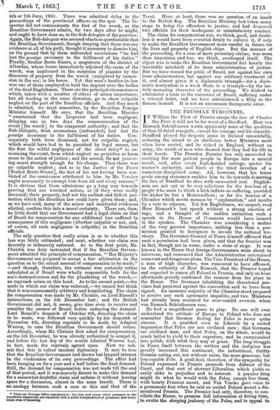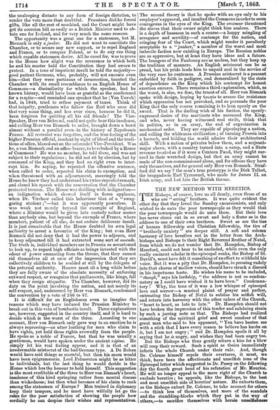THE PRUSSIAN TYRCONNEL.
IF William the First of Prussia escape the fate of Charles the First it will not be for want of a Strafford. Herr von Bismark Schiinhausen wants apparently none of the qualities of that ill-fated renegade, except his courage and his capacity. Strafford played the despotic game in Ireland successfully, reducing the island to an obedience better Ministers must often have envied, and he risked in England, without an army, the wrath of men who showed that they had his life in their hands. The Prussian Premier has only succeeded in exciting the most patient people in Europe into a mental revolt, and, after every high-handed outrage, quotes his master's authority, and hints at the tried devotion of a numerous disciplined army. All, however, that his lower grade among statesmen enables him to do towards deserving the fate of Strafford he does with unwearied zeal. English- men are not apt to he very solicitous for the freedom of a people who seem to think a kick inflicts no suffering, provided the kicker be but a Hohenzollern ; or for the honour of a Chamber which meets menace by " explanation," and insults by a vote to adjourn. Yet few Englishmen, we suspect, read Herr Bismark's last speech without a strong emotion of rage, and a thought of the sudden extinction such a speech in the House of Commons would have insured to the speaker. The Chamber was eonsidering a matter of the very gravest importance, nothing less than a per- mission granted to foreigners to invade the national ter- ritory. The Governor-General of Posen himself affirmed that such a permission had been given, and that the frontier was in fact, though not in name, under a state of siege. It was known in the House that foreign Governments were about to intervene, and rumoured that the Administration entertained some vast and dangerous plans. The Vice- President of the House, a man of high character, was rumoured to have affirmed, on the authority of Herr Bismark, that the Premier hoped and expected to annex all Poland to Prussia, and only an hour afterwards gravely confirmed the rumour from his place in the House. The Germans inhabiting the threatened pro- vince had protested against the convention said to have been signed. An immense majority of the Chamber stood prepared to resolve any such agreement impolitic, and two Ministers had already been censured for over-candid avowals when von Bismark Schanhausen rose.
He had a magnificent game to play. No one will ever understand the attitude of Europe to Poland who does not remember that German feeling for Poles is never quite sincere. It is qualified even in Liberals by a rooted impression that Poles are not civilized men ; that Germans are civilized men, and that Poles, on the whole, would do much better to yield to their superiors, and be currycombed into polish, with what they may of grace. The long struggle in Posen itself between the settlers and the indigenes has greatly increased this sentiment, the industrious, thrifty German eating out, not without noise, the more generous, but less capable Pole. A good deal, therefore, of the sympathy for Poland expressed in Prussia proceeds from distrust of the Court, and that sort of abstract Liberalism which yields so easily alike to prejudice and to interest. A popular king might do what he would with the Poles, except free them, with hearty Prussian assent, and Von Vincke gave voice to a permanent fear when he said an united Poland meant a dis- membered Prussia. The Premier had only, therefore, to con- ciliate the House, to promise full information at fitting time, to excite the sleeping jealousy of the Poles, and to appeal to
the unsleeping distaste to any form of foreign dictation, to render the vote more than doubtful. Prussians dislike forced gifts, like all the rest of mankind, and the Court might have got its coercion bill as easily as a British Minister used to ob- tain one for Ireland, and for very much the same reasons.
The opportunity was a great one for a statesman, but M. Bismark is only a junket% He did not want to conciliate the Chamber, or to secure any new support, or to repel England and France, or to conquer Poland, or to do any one thing which capable statesmen desire. All he cared for, was to prove to the House how slight was the reverence in which both he and his master held the Constitution they had sworn to protect. In a tone of impatient insult he told the majority— good patient Germans, who, probably, will not execute even him—that they were partizans of insurrection, taunted the Chamber with its small resemblance to an English House of Commons—a dissimilarity for which the speaker, had he known history, would have been as grateful as the condemned for a respite—and reminded one speaker that he (Von Unruh) had, in 1848, tried to refuse payment of taxes. Think of that iniquity, gentlemen who follow the Earl who once did that very same thing, and has ever since, because he did it, been forgiven for quitting all his old friends ! The Vice- Speaker, Herr von Behrcnd, could not quite bear this insolence, and calling Herr von Bismark to order, brought down a burst almost without a parallel even-in the history of Napoleonic France. All restraint was forgotten, and the true feeling of the higher Prussian official, insolent by right of blood and the tradi- tions of office, blazed out on the astounded Vice-President. Was he, a von Bismark and an office-bearer, to berebuked by a House of Commons ? He was no member, he told them, and was not subject to their regulations ; he did not sit by election, but by command of the King, and they had no right even to inter- rupt him. So saying, he repeated the offensive sentence, when called to order, repeated his claim to exemption, and when threatened with an adjournment, sneeringly told the House he knew they had understood his twice-repeated remark, and closed his speech with the asseveration that the Chamber protected treason. The House was thrilling with indignation— an indignation which showed itself in fierce applause, when Dr. Virchow called this behaviour that of a "swag- gering student ;"—but it was apparently powerless. It was weak not merely beyond the example of England, where a Minister would be given into custody rather sooner than anybody else, but beyond the example of France, where members, patient of all else, do not endure deliberate insult. It is just conceivable that the House doubted its own legal authority to arrest a favourite of the King ; but even Herr Bismark did not deny that it had the power to adjourn, and to keep adjourned till it had extracted some sort of amends. The truth is, individual members are in Prussia so accustomed to look up, to regard high officials as beings invested with the odour of power emanating from the throne, that they cannot rid themselves all at once of the impression that they are collectively children to be scolded at will by the delegate of the paternal authority. Houses must sit a long while before they are fully aware of the absolute necessity of enforcing outward respect, or recognize that parliaments, like kings, fall when they resign etiquette. The Chamber, however, did its duty on the point involving the nation, and not merely its self-respect, and, undeterred by Herr von Bismark, condemned the convention by a vote of 246 to 57.
It is difficult for an Englishman even to imagine the reasons which may have induced the Prussian Minister to break out in this vein of bombastic insult. Three explanations are, however, suggested in the country itself, and it is hard to decide which is the worst of the three. According to one account, Herr von Bismark only gave way to an emotion he is always repressing—an utter loathing for men who claim to have rights, yet hold those rights avowedly from the people. He spoke as a noble of France, but that he was usually a gentleman, would have spoken under the ancient regime. He _simply let his real feeling appear, and it is that of an irredeemable aristocrat of the bad German type. A De Bohan would have said things as scornful, but then his scorn would have been epigrammatic. Lord Palmerston might be as bitter to individuals, but the last thing he would deride is the House which has the honour to hold himself. This suggestion is the most creditable of the three to Herr von Bismark's heart, insolence of this kind springing rather from mental disease than wickedness; but then what becomes of his claim to rank among the statesmen of Europe ? Men trained in diplomacy keep their tempers, and he must have wilfully let go the reins for the poor satisfaction of showing the people how cordially he can despise their wishes and representatives. The second theory is that he spoke with an eye only to his employer's approval, and insulted the Commons inorderto seem courageous in the eyes of the King. The overseer threatened the slaves that their owner might think him zealous. There is a depth of baseness in such a course—a happy mingling of arrogance and servility—of contempt for the nation, and cringing fear of the Court, which might render it peculiarly acceptable to a " junker," a member of the worst and most imbecile faction now existing in Europe. The Russian nobles are as oppressive, but at least they have ideas and a future. The loungers of the Faubourg are as useless, but they keep up the tradition of manners. An English aristocrat can be as proud, but his pride leads him to unpaid zeal in the service of the very race he contemns. A Prussian aristocrat is a peasant enfeebled by faith in pedigree, and demoralized by the state of dependence on the King which his contempt for honest exertion ensures. There remains a third explanation, which, as the worst, is also, we fear, the truest of all. Herr von Bismark spoke with design, hoping by taunts to arouse the resistance which oppression has not provoked, and so persuade the poor King that the only course remaining is to lean openly on the sword. That is the darling wish of his faction, the openly- expressed desire of the martinets who surround the King, and who, never having witnessed real strife, think that in politics, as in an army, the end of organization is mechanical order. They are capable of pipeclaying a nation, and calling the whiteness civilization ; of turning Prussia into a barrack, and bidding the world admire their architectural skill. With a nation of privates below them, and a serjeant- major above, with a country turned into a camp, and a State revenue treated as if it were a Canteen Fund, they might suc- ceed in their wretched design, but that an army cannot be made of the non-commissioned alone, and for officers they have only themselves, and for general only Herr von Bismark. Straf- ford did we say ? the man's true prototype is the Dick Talbot, the braggadocio Earl Tyrconnel, who made for James II. an Irish army, and lust him the British throne.



























































 Previous page
Previous page